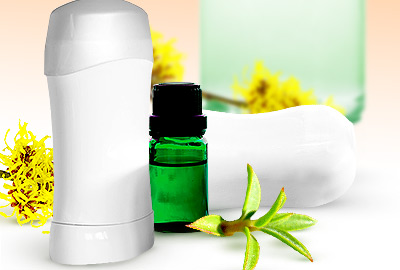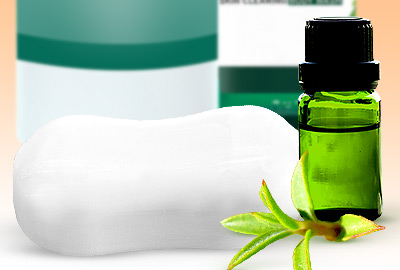Any woman who has experienced midlife body odor changes would agree on how particularly debilitating this menopause symptom can be. Fortunately, women do not have to put up with unpleasant body smells any longer as a wide variety of treatments are readily within reach.
Keep on reading to discover the best approaches to menopause body odor treatment to finally restore your natural, healthy body scent as well as self-confidence.
Three Approaches to Treating Body Odor Changes
When managing body odor, women can choose from among three levels of treatments: (1) Lifestyle changes, (2) Alternative medicine, and (3) Conventional medicine. Women are encouraged to start with the most natural approaches - lifestyle changes and alternative medicine - and move to more risky options only if necessary.
Lifestyle Changes for Body Odor

Enriching one's lifestyle to include healthier practices can provide significant improvements during body odor treatment, although it does require the most determination and time commitment.
Nutritious Diet
While a well-balanced diet is unlikely to treat unpleasant body odor on its own, it can help beat it by promoting hormonal equilibrium and boosting overall health. Women should opt for plant-based proteins, healthy fats, and complex carbs that are rich in the following nutrients:
- Phytoestrogens are plant compounds that exert weak estrogenic effects on the body, helping eliminate body odor and other menopause symptoms.
Soy, alfalfa, oats, tomatoes, flax
- Zinc deficiency is often associated with profuse perspiration, which gives rise to body odor changes. However, this causative relationship is not fully understood.1
Wheat germ, squash, oysters
- Magnesium lacks have also been linked to excessive sweating and unpleasant body odors, although the mechanism behind it has not yet been revealed.2
Spinach, nuts, seeds, fish
Moreover, women are advised to avoid certain food triggers which may cause heavier sweating and intensify body smell, such as carbonated beverages, alcohol, red meat, spicy foods, onions, and garlic.
Regular Exercise
Understandably, women struggling with an unfamiliar body odor might be tempted to skip on exercise. However, staying physically active has proven highly effective in resolving hormonal imbalance and eliminating body odor as well as other menopause symptoms, like mood swings, hot flashes, or sleep disorders.3
Amount: Menopausal women are recommended to get about 150 minutes of low- to moderate-level exercise per week, or 75 minutes of high-intensity activity.4
Type: Women can compose their workouts of cardio exercises with muscle-strengthening training, like resistance bands or yoga. It is also key to stretch before working out to improve flexibility.
Useful tips: To manage excessive sweating and body odor more effectively, it is important to exercise in outdoors or in well-ventilated spaces, wearing loose, moisture-wicking fabrics.
Precautions: It is also a good idea to avoid high-impact exercises or injury-prone sports as menopausal women are at a higher risk of osteoporosis.3
Wholesome Habits
To help the body maintain optimal health, restore hormonal balance, and manage menopausal body odor changes with more ease, women can implement wholesome habits, such as the following:
Reducing stress through yoga, deep breathing exercises, or meditation can help control one's anxious thoughts and prevent their accumulation that might otherwise trigger sweating and exacerbate body odor.
Maintaining good hygiene with regular showers, antibacterial soap, shaving, and deodorants and antiperspirants is key for eliminating sweat and neutralizing bacteria on the skin, whose growth causes unpleasant body odor.
Wearing appropriate clothing, including loose, breathable, and natural fabrics - like cotton, wool, or linen - is important to keep sweat off the skin, preventing bacteria growth, and the body fresh.
Alternative Medicine for Body Odor

Alternative medicine offers a richness of options for treating menopausal body odor changes, of which herbal supplements are the most popular option. They are not only an easy regimen to follow, but also a highly effective one as they resolve the underlying cause of body odor, hormonal imbalance.
There are two types of herbal supplements to treat body odor: phytoestrogenic and hormone-balancing supplements.
Phytoestrogenic Supplements
Phytoestrogenic supplements are made from herbs, like dong quai or red clover, which contain beneficial compounds called phytoestrogens. When consumed, phytoestrogens mimic the body's estrogen and help balance the levels of estrogen and other reproductive hormones for symptom relief. However, their long-term use can make the body less capable of producing its own hormones, leading to further imbalance.
Hormone-Regulating Supplements
Hormone-regulating supplements, like Macafem, do not supply the body with any outside hormones. Instead, they work by nourishing the hormonal glands with nutrients to stimulate their own hormone production. This balances the levels of all reproductive hormones, helping eliminate body odor and other menopausal ailments. Since hormone-balancing supplements cause virtually no side effects, they are safe for long-term use.
From Nature and Health Magazine, Dr. Chacon says:
"Macafem's nutrients help restore natural hormones in women. Unlike hormone drugs, which are basically resumed in taking synthetic hormones, Macafem acts totally different in your body. It nourishes and stimulates your own natural hormone production by inducing the optimal functioning of the pituitary and endocrine glands." Click on the following link if you wantto learn more about Macafem.A combination of lifestyle changes and herbal supplements is usually the most effective and holistic approach to treating body odor changes. In some cases, however, it is necessary to add medications for optimal results.
Conventional Medicine for Body Odor

Depending on its severity, body odor can be treated with a range of conventional approaches. Because some may carry the risk of side effects, their use should be evaluated on an individual basis to ensure they do not outweigh the benefits.
Conventional body odor treatment may consist of medications or medical procedures, including the following:
Medications
Women seeking to treat body odor changes during menopause can consider various prescription medications, most of which aim to relieve the odor by reducing excessive sweating or resolving hormonal imbalance. They are as follows:
Prescription antiperspirants, which contain a higher amount of aluminum salts than over-the-counter options, might be helpful in reducing sweating and managing the body odor it can cause.
Anticholinergic medications - such as glycopyrrolate or benztropine -can be used “off label” to relieve excessive perspiration, though their long-term use in older adults might increase the risk of dementia.5
Cause-specific medications might be prescribed to manage various conditions that might also be behind excessive sweating and body odor, including diabetes, thyroid disorders, or liver disease, among others.
Hormone replacement therapy (HRT) contains estrogen, progesterone, or their combination. It used to be the go-to body odor treatment and answer to other menopause symptoms. While HRT can help eliminate body odor, its use has been linked to serious side effects and increased health risks, as the following studies have shown.
Medical Procedures
In severe cases of body odor due to excessive sweating, women might be offered various surgical interventions, such as:
Botox injections reduce excessive sweating by effectively paralyzing the sweat glands, thus improving body odor.
Iontophoresis can be used to reduce sweating on the hands, feet, and underarms to help battle offensive scents.
Sympathectomy can be performed to treat excessive sweating by surgically cutting or clamping the sympathetic nerve, which controls sweating.
Since the aforementioned levels of body odor treatments are not mutually exclusive, women can employ them in any combination in order to better relieve their symptoms. A growing number of women, however, are finding that combining lifestyle changes and herbal supplements are the best way to eliminate changes in body odor.
A Safe Way of Treating Body Odor
Implementing Lifestyle Changes:
- Eating foods rich in phytoestrogens, magnesium, and zinc
- Exercising regularly outdoors or in well-ventilated spaces
- Reducing stress through mediation, yoga, and deep breathing
- Wearing loose, breathable fabrics and maintaining good hygiene
And Taking Herbal Supplements:
- Phytoestrogenic herbal supplements, like dong quai
- Or natural hormone-regulating supplements, like Macafem
Sources
- American College of Sports Medicine. (2018). Ten Things to Know About Body Odor. Retrieved April 13, 2020 from https://journals.lww.com/acsm-healthfitness/Fulltext/2018/05000/SHAREABLE_RESOURCE__Ten_Things_to_Know_About_Body.17.aspx
- Cleveland Clinic. (2018). Sweating and Body Odor: Care and Treatment. Retrieved April 13, 2020 from https://my.clevelandclinic.org/health/symptoms/17865-sweating-and-body-odor/care-and-treatment
- Harvard Health Publishing. (2005). What to do about excessive sweating? Retrieved April 13, 2020 from https://www.health.harvard.edu/staying-healthy/what-to-do-about-excessive-sweating
- International Hyperhidrosis Society. (n.d.). Oral medications. Retrieved April 13, 2020 from https://www.sweathelp.org/hyperhidrosis-treatments/medications.html
- International Journal of Dermatology. (2011). Evaluation of trace elements, calcium, and magnesium levels in the plasma and erythrocytes of patients with essential hyperhidrosis. Retrieved April 13, 2020 from https://www.ncbi.nlm.nih.gov/pubmed/22126867
- Mayo Clinic. (2019). Sweating and body odor. Retrieved April 13, 2020 from https://www.mayoclinic.org/diseases-conditions/sweating-and-body-odor/diagnosis-treatment/drc-20353898
- Medline Plus. (2019). Endoscopic thoracic sympathectomy. Retrieved April 13, 2020 from https://medlineplus.gov/ency/article/007291.htm
- Stanford University. (n.d.). Thoracoscopic (VATS) Sympathectomy for Hyperhidrosis. Retrieved April 13, 2020 from https://med.stanford.edu/ctsurgery/clinical-care/thoracic-surgery-services/thorascopic-vats-sympathectomy-hyperhidrosis.html
- Stress and Skin Disorders. (2016). Hyperhidrosis and Stress. Retrieved April 13, 2020 from https://link.springer.com/chapter/10.1007%2F978-3-319-46352-0_14
Footnotes:
- Mukherjee, A. (2006). Healing with Food. Mumbai, India: Popular Prakashan. Available via Google Books
- Medline Plus. (2019). Magnesium deficiency. Retrieved April 13, 2020 from https://medlineplus.gov/ency/article/000315.htm
- Journal of Mid-Life Health. (2011). Exercise beyond menopause: Dos and Don'ts. Retrieved April 13, 2020 from https://www.ncbi.nlm.nih.gov/pmc/articles/PMC3296386/
- American Heart Association. (2018). Recommendations for Physical Activity in Adults. Retrieved April 13, 2020 from https://www.heart.org/en/healthy-living/fitness/fitness-basics/aha-recs-for-physical-activity-in-adults
- JAMA. (2015). Cumulative Use of Strong Anticholinergics and Incident Dementia. Retrieved April 13, 2020 from https://jamanetwork.com/journals/jamainternalmedicine/fullarticle/2091745
- JAMA. (2002). Risks and benefits of estrogen plus progestin in healthy postmenopausal women: principal results from the Women's Health Initiative randomized controlled trial. Retrieved April 13, 2020 from https://www.ncbi.nlm.nih.gov/pubmed/12117397
- The Lancet. (2019). Type and timing of menopausal hormone therapy and breast cancer risk: individual participant meta-analysis of the worldwide epidemiological evidence. Retrieved April 13, 2020 from https://www.thelancet.com/journals/lancet/article/PIIS0140-6736(19)31709-X/fulltext



